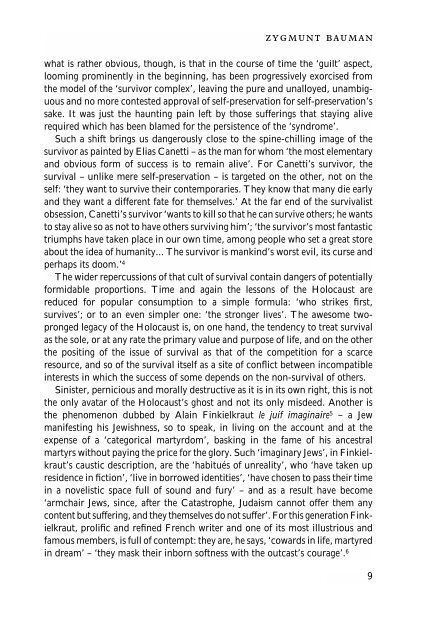Create successful ePaper yourself
Turn your PDF publications into a flip-book with our unique Google optimized e-Paper software.
zygmunt bauman<br />
what is ra<strong>the</strong>r obvious, though, is that in <strong>the</strong> course of time <strong>the</strong> ‘guilt’ aspect,<br />
looming prominently in <strong>the</strong> beginning, has been progressively exorcised from<br />
<strong>the</strong> model of <strong>the</strong> ‘survivor complex’, leaving <strong>the</strong> pure and unalloyed, unambiguous<br />
and no more contested approval of self-preservation for self-preservation’s<br />
sake. It was just <strong>the</strong> haunting pain left by those sufferings that staying alive<br />
required which has been blamed for <strong>the</strong> persistence of <strong>the</strong> ‘syndrome’.<br />
Such a shift brings us dangerously close to <strong>the</strong> spine-chilling image of <strong>the</strong><br />
survivor as painted by Elias Canetti – as <strong>the</strong> man for whom ‘<strong>the</strong> most elementary<br />
and obvious form of success is to remain alive’. For Canetti’s survivor, <strong>the</strong><br />
survival – unlike mere self-preservation – is targeted on <strong>the</strong> o<strong>the</strong>r, not on <strong>the</strong><br />
self: ‘<strong>the</strong>y want to survive <strong>the</strong>ir contemporaries. They know that many die early<br />
and <strong>the</strong>y want a different fate for <strong>the</strong>mselves.’ At <strong>the</strong> far end of <strong>the</strong> survivalist<br />
obsession, Canetti’s survivor ‘wants to kill so that he can survive o<strong>the</strong>rs; he wants<br />
to stay alive so as not to have o<strong>the</strong>rs surviving him’; ‘<strong>the</strong> survivor’s most fantastic<br />
triumphs have taken place in our own time, among people who set a great store<br />
about <strong>the</strong> idea of humanity... The survivor is mankind’s worst evil, its curse and<br />
perhaps its doom.’ 4<br />
The wider repercussions of that cult of survival contain dangers of potentially<br />
formidable proportions. Time and again <strong>the</strong> lessons of <strong>the</strong> <strong>Holocaust</strong> are<br />
reduced for popular consumption to a simple formula: ‘who strikes first,<br />
survives’; or to an even simpler one: ‘<strong>the</strong> stronger lives’. The awesome twopronged<br />
legacy of <strong>the</strong> <strong>Holocaust</strong> is, on one hand, <strong>the</strong> tendency to treat survival<br />
as <strong>the</strong> sole, or at any rate <strong>the</strong> primary value and purpose of life, and on <strong>the</strong> o<strong>the</strong>r<br />
<strong>the</strong> positing of <strong>the</strong> issue of survival as that of <strong>the</strong> competition for a scarce<br />
resource, and so of <strong>the</strong> survival itself as a site of conflict between incompatible<br />
interests in which <strong>the</strong> success of some depends on <strong>the</strong> non-survival of o<strong>the</strong>rs.<br />
Sinister, pernicious and morally destructive as it is in its own right, this is not<br />
<strong>the</strong> only avatar of <strong>the</strong> <strong>Holocaust</strong>’s ghost and not its only misdeed. Ano<strong>the</strong>r is<br />
<strong>the</strong> phenomenon dubbed by Alain Finkielkraut le juif imaginaire 5 – a Jew<br />
manifesting his Jewishness, so to speak, in living on <strong>the</strong> account and at <strong>the</strong><br />
expense of a ‘categorical martyrdom’, basking in <strong>the</strong> fame of his ancestral<br />
martyrs without paying <strong>the</strong> price for <strong>the</strong> glory. Such ‘imaginary Jews’, in Finkielkraut’s<br />
caustic description, are <strong>the</strong> ‘habitués of unreality’, who ‘have taken up<br />
residence in fiction’, ‘live in borrowed identities’, ‘have chosen to pass <strong>the</strong>ir time<br />
in a novelistic space full of sound and fury’ – and as a result have become<br />
‘armchair Jews, since, after <strong>the</strong> Catastrophe, Judaism cannot offer <strong>the</strong>m any<br />
content but suffering, and <strong>the</strong>y <strong>the</strong>mselves do not suffer’. For this generation Finkielkraut,<br />
prolific and refined French writer and one of its most illustrious and<br />
famous members, is full of contempt: <strong>the</strong>y are, he says, ‘cowards in life, martyred<br />
in dream’ – ‘<strong>the</strong>y mask <strong>the</strong>ir inborn softness with <strong>the</strong> outcast’s courage’. 6<br />
9

















